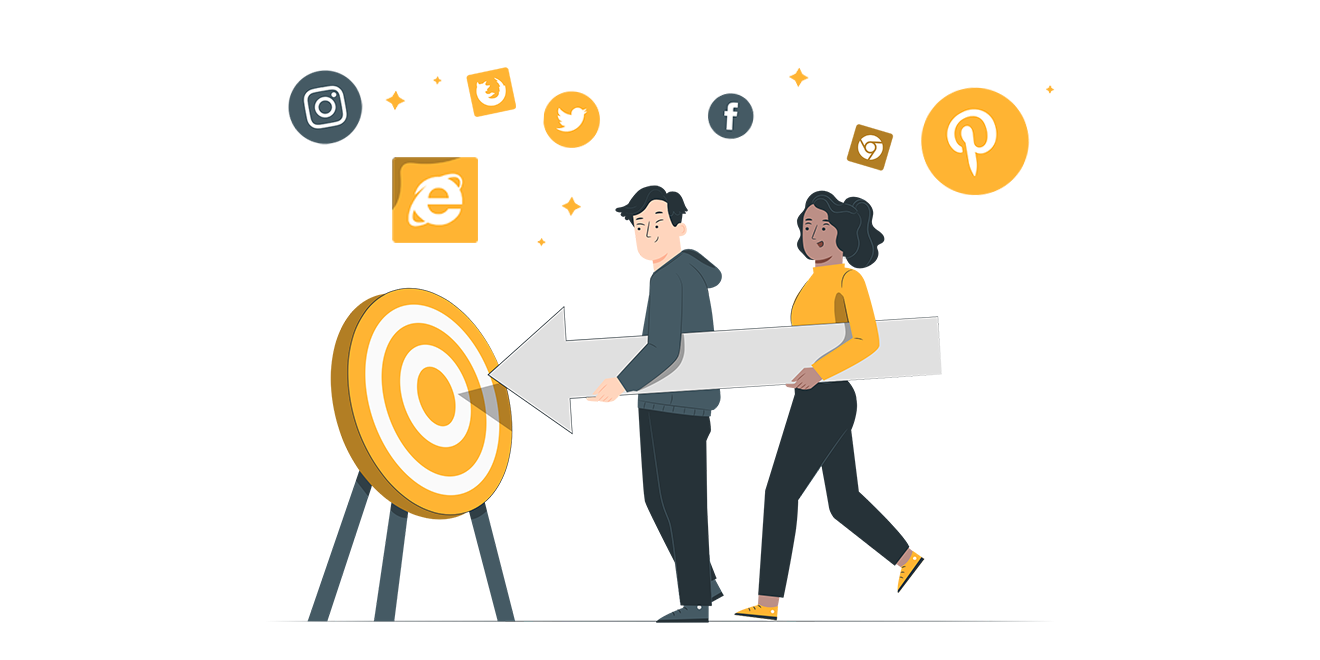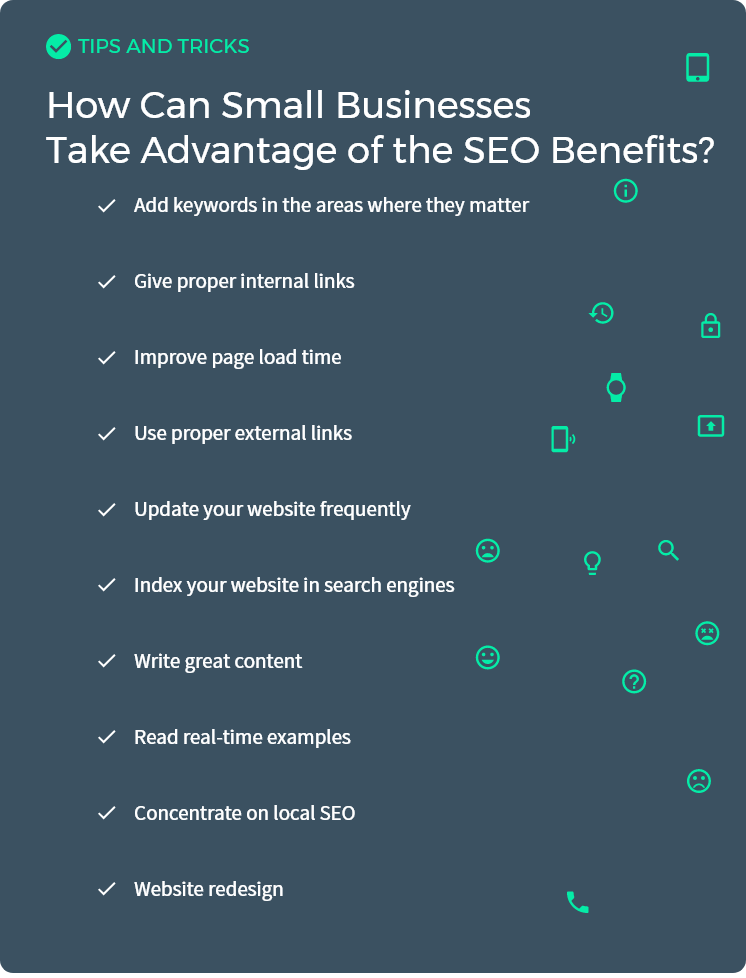SEO For Small Business To Attract Leads Organically
If you own a small business, you know that success requires a lot of hard work and effort. You also understand the need for online visibility to grow your business. For your business to be successful, you need effective marketing strategies.
One of the best ways to make your website visible to potential customers is through search engine optimization (SEO). This blog article will explain what SEO is and how it works for small businesses.
Running a small business is hard, but it can seem impossible if you don’t know how to make your website accessible to potential clients.
You can increase the number of visitors to your website by optimizing it for search engines. Make sure your company’s online presence grows.
What is Search Engine Optimization (SEO)?
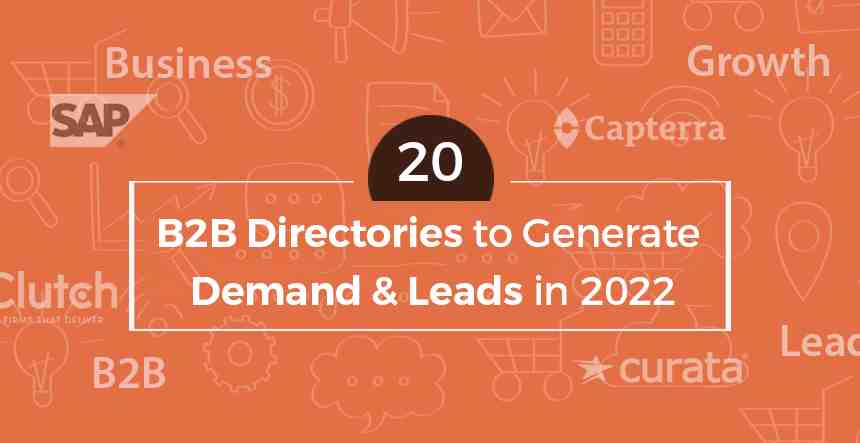
Optimizing a website for organic visibility in SERPs (search engine results pages) is known as search engine optimization (SEO). This inbound marketing strategy makes your business more visible to those searching for similar items or services online. SEO also ensures that you are found when consumers search for a specific term.
Providing SEO services to small businesses

With hundreds of thousands of websites to choose from, you want yours to show up when people are looking for them. It could be information, a product, a service, office hours, etc. Even as you read this, people online are looking for you. However, if your website is getting lost in the shuffle, you’ll need to invest in a well thought out SEO plan.
If you think SEO is only for big companies, you are wrong! SEO is crucial for small businesses, and a smart approach can help you increase your online exposure, traffic and revenue.
Search engine algorithms are constantly updated to provide the best results for each query. So you don’t simply need a small business SEO plan; you also need an effective small business SEO approach that works.
Local SEO For Small Business:
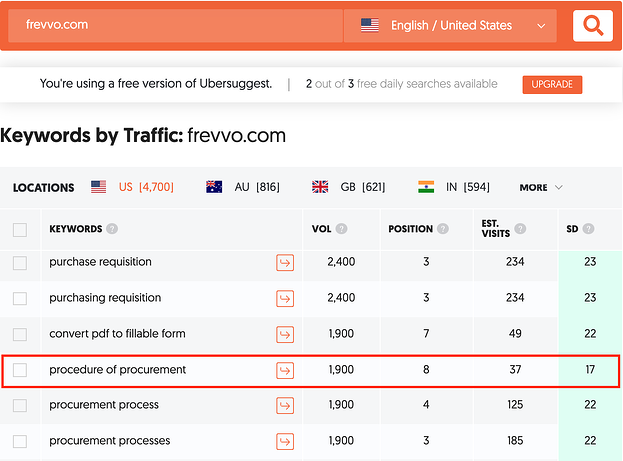
Local SEO can be an effective method to promote your business. Small businesses should ensure that their website appears in local searches to the right audience in order to grow their business. Target results are determined using location-based targeting.
As we can see, the term “local SEO” refers to SEO based on a geographic location. Any local business can benefit from these local SEO services. A doctor, lawyer, banker, tailor, plumber or any other local business that sells goods and services can be called a local business.
When an Internet user searches for a product or service online (for example, “Best Restaurants in the Bay Area”), your website will appear in the search results if your local SEO is done correctly, which can indirectly help grow your business.
I hope you now understand why local SEO is important for small businesses. The basic concept is that you have a physical address (for example, a store) in a city where people can buy your goods.
It also helps to brand your business by advertising your website, which includes your name, services and address, among other things. Local SEO services for small businesses go a long way in growing a company’s brand.
Learn how to choose local SEO experts to help your business reach a local audience.
Create Better User Experience:
You have six seconds to make a good first impression on your audience. Websites that take a long time to load are hard to browse, cluttered, don’t work on mobile devices, or don’t provide meaningful content that online users don’t appreciate.
You can guarantee that your website provides the best user experience by investing in SEO. And user experience has a significant impact on search engine rankings.
Generate traffic to your website
SEO helps to drive traffic (online users) to your website organically (without spending on Google Ads). Websites that are listed on the first page of SERPs generate more visitors than those that are ranked on the second page.
In SERP, the first place is occupied by 32% of visitors; 2nd place gets 17%, and 3rd place 11% of clicks. The higher you rank, the more traffic you can expect.
Know your competitors
Your website isn’t the only place SEO can help you. To outrank your competition, you need a thorough understanding of their websites.
As your small business SEO expert, we can help you discover who your main competitors are, what keywords they rank for, what search queries you and your competition have in common, etc.
Learn about your buyers
Buyer persona is another important part where our SEO approach can help you. The problem with conventional media is that you can’t know how many of your target consumers are seeing and reacting to it. When you use SEO, you have access to some valuable data.
You can track how many people came to your site from organic search results, what they searched for, how your site helped them or didn’t help them, and so on. These are all key pieces of information that can help strengthen your relationship with customers.
The Benefits of SEO For Small Businesses

Search engine optimization is the strategy of every business with a digital footprint. Websites that are ranked first in search results are more likely to get traffic, while websites that are ranked second, third, or anywhere else are less likely to get traffic.
Small businesses don’t have to be incapable of ranking on the first page of search engine results. They can beat the competition and raise their ranking with the right strategy.
SEO is Essential for Small Businesses
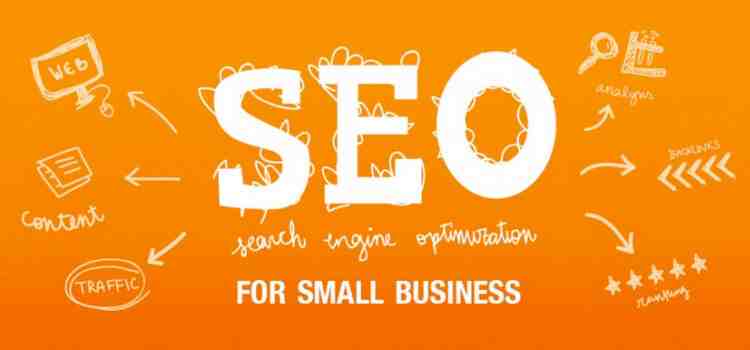
On-page and off-page factors affect your search engine results, which should be considered when developing an SEO strategy.
On-Page SEO:
The on-page SEO guidelines on your website, such as title tags, meta descriptions, and body text, are called on-page SEO. Because you have direct control over these components, they are easier to work with.
Take the time to improve these elements and include keywords where appropriate if you haven’t already. A common and effective technique to increase your search engine ranking for certain terms and phrases. On-page optimization contributes,
Off-Page SEO
Off-page SEO helps increase the authority of your website. It also helps your website rank well in external search engines. Links are the most important off-page components as they act as “voices” from other web pages.
This is a little more difficult than on-page SEO, but the simplest explanation is that the more quality links your site has, the better your chances of ranking high.
Building links takes time, but creating high-quality content on your website is the best way to do it. If you post material that others find useful or interesting, chances are they’ll want to share it.
Conclusion:
Although search engines use advanced algorithms to deliver reliable results that consumers want, you can compete with both small businesses and large corporations if you produce good content.
Although specific elements change all the time, and SEO can require significant effort, it can increase your brand’s online exposure and increase sales. Your small business website results in long-term value and lasting power when you hire the right SEO company.
Real-time reporting in Campaign Manager makes it easy to show the value of your marketing to LinkedIn prospects. Use conversion tracking to measure website conversions from your LinkedIn ads and use built-in analytics to optimize your campaigns. “LinkedIn is one of the most valuable channels for qualified leads.
What is a good cost per lead LinkedIn?
| Lead generation channel | Average price per potential client |
|---|---|
| LinkedIn advertising | 75 dollars |
| Webinars | 72 dollars |
| Display advertising | 63 dollars |
| Content marketing | 92 dollars |
What is the average cost per lead on LinkedIn? Because the demographics are more specific, LinkedIn makes you pay more for the high-quality leads you’ll get. On average, a lead from paid LinkedIn ads costs $75. High-end, lead can cost around $99. On the other hand, the lowest price, around $51.
What should I pay for lead generation?
Some lead generation companies price their services in the range of $2,000 to $20,000 per month. Lead billing rates range from $50 to $400 per appointment.
How is lead generation cost calculated?
The formula for cost per contact is simple. Simply take your total marketing spend and divide it by the total number of new leads. This will give you your cost per lead (CPL). You need to make sure that you calculate the number of leads and marketing spend within the same time frame to ensure that your result is accurate.
How much do leads usually cost?
Lead cost varies widely from industry to industry. According to Madison Logic’s cost-per-contact infographic, if you want to reach marketers, you should expect to spend an average of $35 per contact. But in the healthcare sector, the average cost per lead is $65 per person.
Should cost per lead be high or low?
The higher the CPL compared to other businesses in your industry, the less effective the marketing campaign is. Of course, a lower CPL is considered ideal. CPL is just one of many metrics that digital marketers often look at.
Why is cost per lead important?
Why is that important? Cost per leads allows sales and marketing teams to set their sales goals, calculate potential ROI and determine advertising budgets. CPLs are determined by the total cost of generating a single lead, which is an important part of the lead generation process.
What is a good cost per?
In short, a good CPC is determined by your target ROI. For most businesses, a 20% CPA or a 5:1 ad revenue-to-cost ratio would be acceptable. Then use the formulas above to determine the target cost per click for your ad campaigns.
Is a high cost per lead good?
A low cost per lead with a high number of quality leads is a good indicator that your campaign is working well, but if your cost per lead is too high, continuing the campaign is extremely difficult to justify.
Is a high cost per lead good?
A low cost per lead with a high number of quality leads is a good indicator that your campaign is working well, but if your cost per lead is too high, continuing the campaign is extremely difficult to justify.
Why is cost per lead important?
Why is that important? Cost per leads allows sales and marketing teams to set their sales goals, calculate potential ROI and determine advertising budgets. CPLs are determined by the total cost of generating a single lead, which is an important part of the lead generation process.
What do you mean by cost per lead?
Cost per lead, often abbreviated as CPL, is a pricing model for online advertising, where the advertiser pays for an explicit application from a consumer interested in the advertiser’s offer. Also commonly referred to as online lead generation.
Why is my cost per lead so high on Facebook?
Here are some additional things that can cause a high cost per contact on Facebook: An audience that is less than optimal for the product or service you are promoting. the lead form asks too many questions causing people to give up before completing it.
How many types of SEO are there?
There are about 12 different types of SEO that help websites rank better on search engine results pages.
What are the 4 phases of SEO? Phases of our SEO campaigns
- Phase 1 â Onboarding, site assessment, strategy development.
- Phase 2 â On-site optimization.
- Phase 3 â Off-page optimization, citation submission and cleanup.
- Phase 4 â Ongoing and Advanced SEO: Link Building, Monitoring, Updates.
What are the 3 types of SEO?
There are three main types of SEO: internal (ON-Page SEO) external (Off-Page SEO) technical SEO.
What is SEO and its types?
The term SEO, Search Engine Optimization, refers to improving the visibility of your website in Google search results for relevant keywords or search terms. SEO helps in generating website traffic naturally.
How important is SEO for a new business?
In short, SEO is key because it makes your website more visible, which means more traffic and more opportunities to convert leads into customers. Check out the SEO tools you can use for optimal ranking.
Is SEO still relevant in 2022? Will SEO still be relevant in 2022? Yes of course. Although some SEO tactics that were effective in the past have stopped working, SEO has continued to evolve. It’s constantly reinventing itself to better align with user intent, scrapping unwanted, ineffective tactics to make it better.
How important is SEO for your business?
This is the importance of SEO for your business: SEO gives you the power to be the answer to potential customers’ questions. In addition to visibility and increased traffic, SEO contributes to your authoritative voice in your field. Authority then leads to trust in the brand, which ultimately leads to brand loyalty.
Why SEO is important for your business in 2022?
SEO not only allows you to rank high on Google quality traffic, high visibility of your website, but also provides you with a multifaceted strategy that helps you advertise, sell, as well as improve the performance of your brand. Despite this, marketers don’t understand the need to invest in SEO in 2022.
Why SEO is important for small business?
SEO is important because it helps you establish yourself as an expert in your field and drive traffic to your website, while helping you promote your business organically for free. If you’re not sure about the importance of SEO, you’re not alone. Only 36% of small businesses actually have an SEO strategy.
What is SEO & Why is it important?
SEO stands for Search Engine Optimization – the practice of increasing the quantity and quality of traffic to your website through organic search engine results. The ultimate goal of SEO for business is to generate organic traffic – searchers who click through to your website from a search engine results page (SERP).
What is SEO and how does it impact your business?
How does SEO affect business? Search engine optimization impacts business by improving your ranking in relevant search results. By ranking high enough, such as on the first page, your business can use SEO to drive qualified traffic to your site, which can lead to more leads, sales, and revenue for your business.
Is SEO worth it for small business?
The short answer is that SEO is very effective – not only for generating traffic, but also for leads and sales. Do not worry. The long answer includes research and data, not just empty statements. Most SEOs get too caught up in search-specific metrics like SERPs (Search Engine Results Page), rankings, and organic traffic.
Is SEO a waste of money?
The short answer is that SEO works and can improve your business by offering your company ROI. The reality is that it could also waste your money if done the wrong way.
Does SEO work for small business?
Small businesses can use SEO to their advantage by creating valuable content for their website visitors, using keywords throughout their content, and optimizing images for SEO. With a little effort, you can see the results of your SEO efforts in higher search engine rankings and more traffic to your website.
Is starting an SEO business worth it?
With most SEO experts charging $500-1000 per month, five conversions are worth between $2500-5000 per month. If we assume that customers stay for an average of 6 months, those five conversions are worth $15,000 – $30,000.
How much should a small business pay for SEO?
How Much Does SEO Cost for Small Businesses? The average cost of SEO for a small business is $750 to $2,000 per month, or $5,000 to $30,000 for one-off projects. Smaller businesses investing in SEO consulting services can expect to pay $80 to $200 per hour.
When should I use SEO?
When to use SEO. SEO should be used when you want to get to the top of a search engine and/or stay at the top. This is not something that happens overnight, it requires an SEO strategy that uses many key elements to achieve this. However, once you achieve this, you can enjoy long-lasting benefits.
Is SEO important for every business? SEO is equally important for every business, regardless of industry or competition. Again, this is because you can’t control many factors that surround you, but you can control your SEO. And if you can directly influence your website traffic, rankings and sales or leads… why wouldn’t you?
Why should I use SEO?
In the simplest terms, good SEO optimizes your online visibility. This means that the more people see your website, the more your internet traffic increases and the more chances you have to offer your product or service to more people.
When should I use SEO and paid search?
SEO takes time to implement and return positive results. PPC allows for more immediate results. As such, paid search is a great short-term solution for promoting your products and services, especially if you offer seasonal or time-sensitive offers. So when you feel the need for speed, choose PPC.
What would you use SEO for?
SEO stands for Search Engine Optimization. In the simplest terms, good SEO optimizes your online visibility. This means that the more people see your website, the more your internet traffic increases and the more chances you have to offer your product or service to more people.
When should you do SEO?
Whether you are launching a brand new website or launching a redesign of an existing website, the short answer to the question “When should I start SEO for my new website?†is the same – before launch.
Do I need SEO for every page?
So it should come as no surprise that one of the most common questions our team hears is “Do I really need to optimize every page on my website?†In short: Yes. Keep reading to find out why and give us a call at 888-601-5359 to start optimizing your site.
When should you do SEO?
Whether you are launching a brand new website or launching a redesign of an existing website, the short answer to the question “When should I start SEO for my new website?†is the same – before launch.
Is SEO good for beginners?
If you’re serious about improving your search traffic and are new to SEO, we recommend reading The Beginner’s Guide to SEO from front to back. We’ve tried to make it as concise and easy to understand as possible, and learning the basics of SEO is a crucial first step in achieving your online business goals.
Do I need SEO for every page?
So it should come as no surprise that one of the most common questions our team hears is “Do I really need to optimize every page on my website?†In short: Yes. Keep reading to find out why and give us a call at 888-601-5359 to start optimizing your site.
Can I learn SEO in 2 months?
It takes 1-3 months to learn SEO at a basic level, and even 6-18 months to learn SEO at an advanced level. How long it takes to learn SEO depends on the number of hours you spend studying search engine optimization each day.
How often should I do SEO?
According to Jonny Ross Consultancy and other industry experts, it is recommended that you review your keyword strategy on a quarterly basis and at least 3 – 6 months before any campaign or promotion.
Do I need SEO for every page?
So it should come as no surprise that one of the most common questions our team hears is “Do I really need to optimize every page on my website?†In short: Yes. Keep reading to find out why and give us a call at 888-601-5359 to start optimizing your site.
How many pages should a website have for SEO?
Generally speaking, 10-30 pages of well-crafted content showcasing your products and services should be sufficient for most SMBs.
Does number of pages affect SEO?
The amount of pages on your website is not enough to determine and maintain your website’s rank on Google. Many sites are of no use if the content they display is not relevant to users.
How often do I need SEO?
According to Jonny Ross Consultancy and other industry experts, it is recommended that you review your keyword strategy on a quarterly basis and at least 3 – 6 months before any campaign or promotion.
Is a one page site good for SEO?
Single page websites are great for targeting a specific audience and providing a specific type of user experience. It’s easy to control their behavior on your site and steer them in one particular direction if you don’t have to worry about them clicking on different pages, perhaps in the wrong order.
